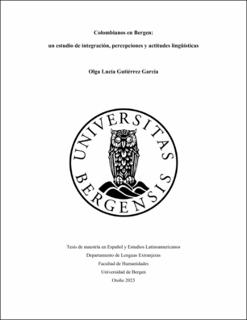| dc.description.abstract | Colombians in Bergen: A Study of Integration, Perceptions, and Linguistic Attitudes
This research aims to identify the linguistic perceptions and attitudes of Colombian residents in Bergen toward their Spanish and the Norwegian language they encounter. Additionally, the study analyzes how these attitudes influence the social and linguistic integration of the Colombian community in Norway.
The study follows sociolinguistic principles related to linguistic perceptions, attitudes, and sociolinguistic integration. It also considers languages in contact and the phenomena that arise from language coexistence. Methodologically, a questionnaire consisting of 42 open and closed-ended questions, including a Likert scale, was applied. The sample included 20 participants, considering sociolinguistic variables such as gender, age, and duration of residence.
Quantitative and qualitative methods were used to analyze the obtained data. The questionnaire was divided into three sections: personal information, language use, and language and identity. To address the research objectives and analyze the results, the analysis was divided into five sections thematically: attitudes and perceptions toward the Norwegian language, attitudes and perceptions toward Spanish, language use and preferences, phenomena derived from language contact, and linguistic and social integration in the Norwegian context.
Key findings highlight positive attitudes toward both Spanish and Norwegian. Participants express positive attitudes toward their variety of Spanish, demonstrating loyalty to their language variety, linking it to the preservation of their cultural roots and as a symbol of identity in the Norwegian context. Regarding Norwegian, participants show a positive trend towards learning the language, based on favorable self-evaluations of various communicative skills and enjoyment of the Norwegian language. Despite perceiving the language's complexity due to substantial dialectal variation, participants exhibit a strong desire to learn it and significantly value linguistic correctness. The use of certain words as loanwords, resulting from language contact, is emphasized, with participants explaining their usage: it is easier to say it in Norwegian, even though it exists in Spanish. It is acknowledged that these linguistic loans are shared realities but carry different cultural connotations in each country.
The linguistic perceptions and attitudes of Colombians are linked to their linguistic and social integration process. While Colombians express knowledge of the host country's language, data suggest limited social integration with the local community, indicating misalignment between linguistic and social dimensions. The analysis indicates that integration primarily occurs in the workplace, while socially and within the family, Colombians are more connected to citizens from other countries, whether Spanish speakers or not, motivated by common cultural ties and linguistic affinity. | |
